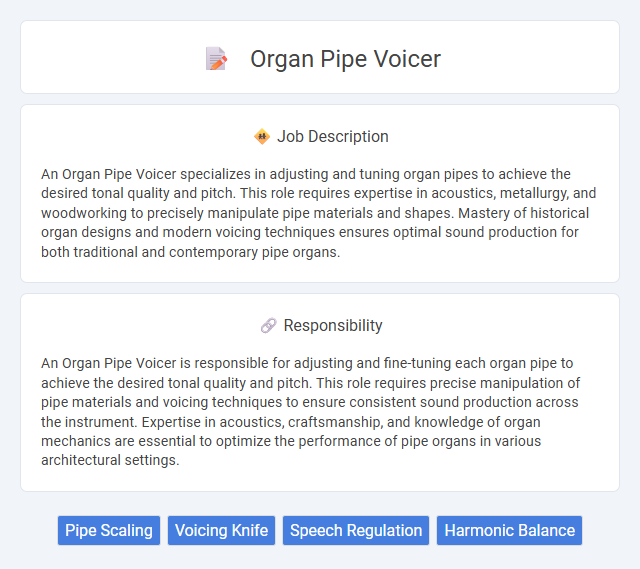
An Organ Pipe Voicer specializes in adjusting and tuning organ pipes to achieve the desired tonal quality and pitch. This role requires expertise in acoustics, metallurgy, and woodworking to precisely manipulate pipe materials and shapes. Mastery of historical organ designs and modern voicing techniques ensures optimal sound production for both traditional and contemporary pipe organs.
Individuals with a strong ear for music, attention to detail, and patience are likely well-suited for the role of an organ pipe voicer. Those who may struggle with fine manual dexterity or have difficulty concentrating for extended periods might find this job challenging. The position probably demands physical stamina and a calm demeanor, making it less suitable for people who are easily stressed or uncomfortable working in confined spaces.
Qualification
An Organ Pipe Voicer must possess specialized skills in voicing and tuning pipe organs, requiring a deep understanding of acoustics, organ mechanics, and sound regulation techniques. Qualifications typically include formal training in organ technology or music acoustics, combined with hands-on experience in adjusting pipe ranks to achieve desired tonal quality. Proficiency in interpreting organ schematics and conducting meticulous voice regulation ensures optimal instrument performance in various acoustical environments.
Responsibility
An Organ Pipe Voicer is responsible for adjusting and fine-tuning each organ pipe to achieve the desired tonal quality and pitch. This role requires precise manipulation of pipe materials and voicing techniques to ensure consistent sound production across the instrument. Expertise in acoustics, craftsmanship, and knowledge of organ mechanics are essential to optimize the performance of pipe organs in various architectural settings.
Benefit
An organ pipe voicer job likely offers the benefit of preserving and enhancing the unique tonal qualities of pipe organs, contributing to cultural heritage and musical artistry. This role probably provides opportunities to develop highly specialized skills in acoustics and craftsmanship, which could lead to increased job satisfaction and career advancement. Working closely with historic and modern instruments may also offer a sense of fulfillment and pride in maintaining these complex musical devices.
Challenge
Organ pipe voicers likely encounter the challenge of achieving precise tonal balance and consistency across a wide range of pipes, each with unique acoustic properties. The job may require a deep understanding of both musical theory and mechanical craftsmanship to adjust pipes for optimal sound quality. Mastery of this skill probably demands patience, attention to detail, and significant experience in voicing techniques.
Career Advancement
An organ pipe voicer specializes in tuning and adjusting the pipes of pipe organs to produce optimal sound quality, requiring expert knowledge of acoustics, materials, and organ mechanics. Career advancement opportunities include progressing to master voicer roles, leading restoration projects, or becoming a consultant for prestigious churches, concert halls, and organ builders worldwide. Continuous skill development in voicing techniques and historical organ styles can lead to higher demand and enhanced professional reputation in this niche field.
Key Terms
Pipe Scaling
An organ pipe voicer specializing in pipe scaling meticulously adjusts pipe lengths and diameters to achieve optimal tonal balance and volume across the instrument. Precise scaling influences the harmonic spectrum and voicing consistency, ensuring each pipe produces a clear, stable pitch aligned with the organ's overall sound design. Mastery in pipe scaling requires deep understanding of acoustics, metal properties, and historical voicing techniques to tailor the organ's voice accurately.
Voicing Knife
The organ pipe voicer uses a voicing knife to meticulously adjust pipe speech and tonal quality by scraping and thinning metal pipes or wooden pipes. Precise manipulation with the voicing knife enhances the pipe's attack, timbre, and volume, ensuring consistent sound production. Mastery of the voicing knife technique is essential for achieving the organ's desired acoustical characteristics and overall musical expression.
Speech Regulation
An Organ Pipe Voicer specializing in Speech Regulation fine-tunes pipe speech characteristics to ensure precise tonal clarity and accurate pitch control. This role involves meticulous adjustments to pipe tongues, slots, and shallots to optimize speech attack and sustain, enhancing the organ's dynamic expression. Mastery in speech regulation directly impacts the instrument's ability to articulate musical passages with defined attack and consistent tone quality.
Harmonic Balance
An organ pipe voicer expertly adjusts pipe speech to achieve perfect harmonic balance, ensuring each pipe produces a rich and clear tone that complements the overall ensemble. This process involves fine-tuning the pipe's scaling, voicing sleeves, and wind pressure to harmonize overtone frequencies, optimizing tonal color and volume consistency. Mastery in harmonic balance enhances the organ's musicality, allowing the instrument to project precise and resonant sound across diverse acoustic environments.
 kuljobs.com
kuljobs.com